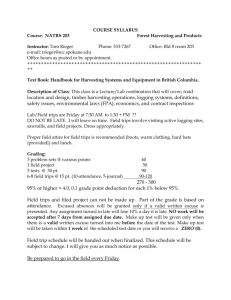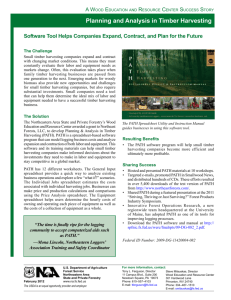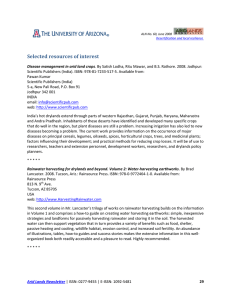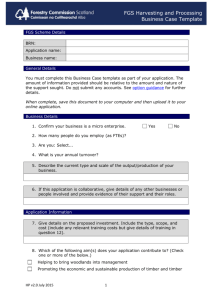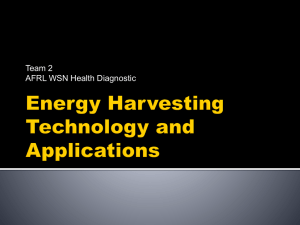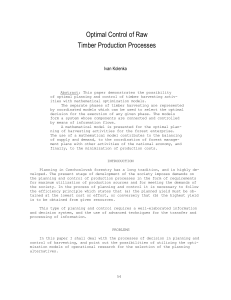Course Form
advertisement
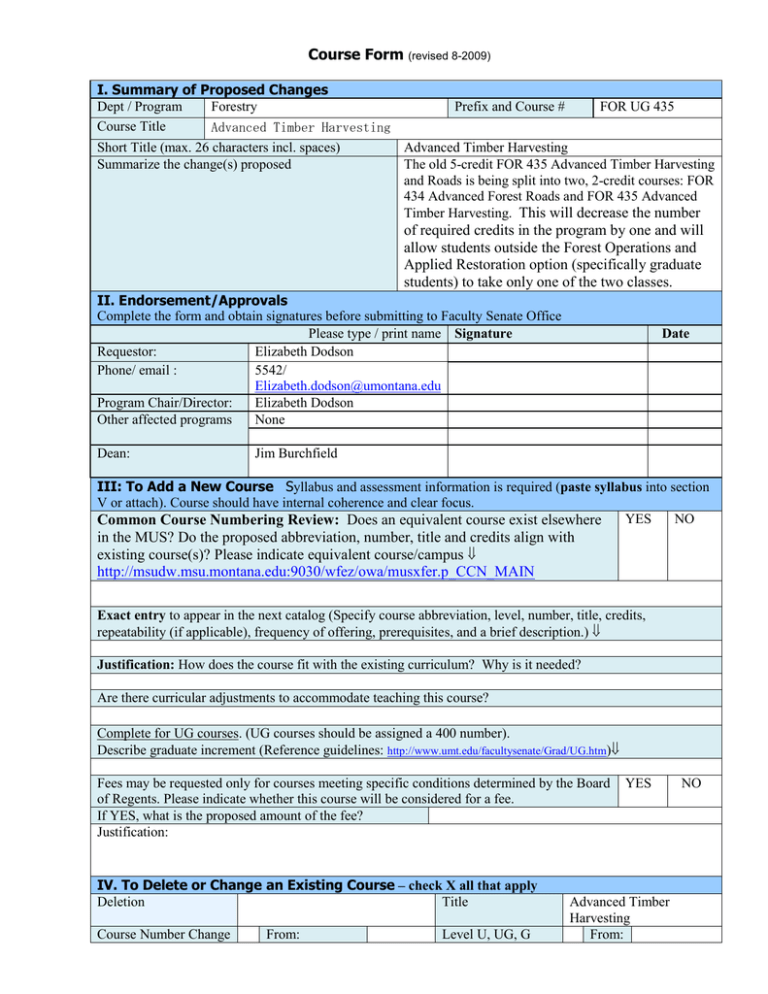
Course Form (revised 8-2009) I. Summary of Proposed Changes Dept / Program Forestry Course Title Advanced Timber Harvesting Short Title (max. 26 characters incl. spaces) Summarize the change(s) proposed Prefix and Course # FOR UG 435 Advanced Timber Harvesting The old 5-credit FOR 435 Advanced Timber Harvesting and Roads is being split into two, 2-credit courses: FOR 434 Advanced Forest Roads and FOR 435 Advanced Timber Harvesting. This will decrease the number of required credits in the program by one and will allow students outside the Forest Operations and Applied Restoration option (specifically graduate students) to take only one of the two classes. II. Endorsement/Approvals Complete the form and obtain signatures before submitting to Faculty Senate Office Please type / print name Signature Requestor: Elizabeth Dodson Phone/ email : 5542/ Elizabeth.dodson@umontana.edu Program Chair/Director: Elizabeth Dodson Other affected programs None Dean: Date Jim Burchfield III: To Add a New Course Syllabus and assessment information is required (paste syllabus into section V or attach). Course should have internal coherence and clear focus. YES NO Common Course Numbering Review: Does an equivalent course exist elsewhere in the MUS? Do the proposed abbreviation, number, title and credits align with existing course(s)? Please indicate equivalent course/campus http://msudw.msu.montana.edu:9030/wfez/owa/musxfer.p_CCN_MAIN Exact entry to appear in the next catalog (Specify course abbreviation, level, number, title, credits, repeatability (if applicable), frequency of offering, prerequisites, and a brief description.) Justification: How does the course fit with the existing curriculum? Why is it needed? Are there curricular adjustments to accommodate teaching this course? Complete for UG courses. (UG courses should be assigned a 400 number). Describe graduate increment (Reference guidelines: http://www.umt.edu/facultysenate/Grad/UG.htm) Fees may be requested only for courses meeting specific conditions determined by the Board of Regents. Please indicate whether this course will be considered for a fee. If YES, what is the proposed amount of the fee? Justification: IV. To Delete or Change an Existing Course – check X all that apply Deletion Title Course Number Change From: Level U, UG, G YES Advanced Timber Harvesting From: NO To: Description Change Change in Credits From: To: To: 5 2 Prerequisites 1. Current course information at it appears in catalog (http://www.umt.edu/catalog) UG 435 Advanced Timber Harvesting and Forest Road 5 cr. Offered autumn. Prereqs., FOR 235, 347, 340, 351; Coreq., FOR 436. This course covers the fundamentals of logging feasibility and cost analyses of various timber harvesting systems including the characteristics and performance of ground vehicles, cable and aerial systems; cost factors and cost analysis procedures; safety issues; and environmental impacts of harvesting systems as well as forest road location, surveying, design, construction and maintenance, and management of existing road systems. Repeatability Cross Listing (primary program initiates form) Is there a fee associated with the course? 2. Full and exact entry (as proposed) UG 435 Advanced Timber Harvesting 2 cr. Offered autumn. Prereqs., FOR 235, 347, 340, 351. This course covers the fundamentals of logging feasibility and cost analyses of various timber harvesting systems including the characteristics and performance of ground vehicles, cable and aerial systems; cost factors and cost analysis procedures; safety issues; and environmental impacts of harvesting systems . 3. If cross-listed course: secondary program & course number 4. Is this a course with MUS Common Course Numbering? If yes, then will this change eliminate the course’s common course status? Please explain below. No 5. Graduate increment if level of course is changed to UG. Reference guidelines at: http://www.umt.edu/facultysenate/Grad/UG.htm (syllabus required in section V) Have you reviewed the graduate increment x guidelines? Please check (X) space provided. In order for students to receive graduate credit for the course, a 5-10 page term paper addressing a current forest road issue, focusing on the use of forest operations to solve a complex natural resource problem, is required. The paper will be of publishable quality, including an introduction, literature review, presentation of the issue, discussion of the significance for management, conclusion, and references to literature cited. 6. Other programs affected by the change 7. Justification for proposed change none By splitting the content of the old FOR 435 course into two courses it will allow students, specifically graduate students, additional flexibility to pick up only forest road or timber harvesting knowledge and experience. For students within FOAR, this change will decrease the number of required credits within the program by one. Students do not need this credit to meet other college or university requirements (i.e. upper division credits within the College) and therefore can use this additional credit for electives. By breaking up the course content into two separate offerings, this also allows for greater instructor flexibility as there will now be one instructor per course. V. Syllabus/Assessment Information Required for new courses and course change from U to UG. Paste syllabus in field below or attach and send digital copy with form. FOR UG 435 Advanced Timber Harvesting (2 credits) Instructors: Office: Phone: Email: Office hours: Beth Dodson FOR 201A 243-5542 elizabeth.dodson@umontana.edu Class Date: Second 8 weeks of the semester (including finals week) Class Times: Two 1.5 hour lectures (TR 1:10 – 2:30P) One 3 hour lab (F 10:10A – 2:00P) Required Text: - Faculty pack on logging mechanics 1. Pre-requisite: MATH 150, FOR 235, FOR 340 or FOR 341, FOR 347 2. Course Descriptions: The purpose of this course is to provide students with advanced knowledge and skills to apply, critically analyze, and evaluate various timber harvesting systems. This course covers the fundamentals of logging feasibility and cost analyses of various timber harvesting systems including the characteristics and performance of ground vehicles, cable and aerial systems; cost factors and cost analysis procedures; safety issues; and environmental impacts of harvesting systems. The laboratory components of this course will provide students with basic working knowledge to conduct logging feasibility and cost analyses of various timber harvesting systems. Students will also learn how to use some of the major software packages that can be used in analyzing various harvesting systems. 2. Course Learning Objectives: Ground-based harvesting system Understand the fundamentals of engineering mechanics (statics) Understand the characteristics of ground vehicles (power, gears, torque multipliers, tires and tracks) Understand the performance of ground vehicles (gradeability, stability, ground pressure) Understand cost factors and learn cost analysis procedures Learn how to use computer software for ground-based harvesting system analysis (SKID PC & Logcost51) Understand safety issues on ground-based harvesting operations Understand environmental impacts of ground-based harvesting systems Understand factors important in the layout and administration of a ground-based harvesting operation Cable and aerial logging system Understand the engineering properties of wire rope Learn the procedures of payload analysis Learn how to use computer software for payload analysis (LOGGER PC) Understand cost factors and learn cost analysis procedures Understand safety issues on cable and aerial logging operations Understand environmental impacts of cable logging system Understand factors important in the layout and administration of cable and aerial logging systems 3. Grading: Harvest design project Lab exercises and homework 30% 70% 100% In order for students to receive graduate credit for the course, a 5-10 page term paper addressing a current management issue, focusing on the use of forest operations to solve a complex natural resource problem, is required. The paper will be of publishable quality, including an introduction, literature review, presentation of the issue, discussion of the significance for management, conclusion, and references to literature cited. 4. Tentative course schedules: Week Date Tuesday Thursday Friday (Lab) 1 26-Oct Characteristics of ground vehicles Performance of ground vehicles SkidPC (in class) 2 2-Nov Environmental impacts of ground-based harvesting Application of groundbased harvesting, administration of sale Layout of ground unit 3 9-Nov Wire rope Payload analysis I Run profiles 4 16-Nov Payload analysis II Chain and Board Conduct payload analysis I (in class) 5 23-Nov Logger PC Thanksgiving Thanksgiving 6 30-Nov Logger PC Environmental impacts of cable harvesting Conduct payload analysis II (in class) 7 7-Dec Logging Safety Administration of cable sale Layout Project 8 14-Dec Final Layout Project All students must practice academic honesty. Academic misconduct is subject to an academic penalty by the course instructor and/or a disciplinary sanction by the University. All students need to be familiar with the Student Conduct Code. The Code is available for review online at http://www.umt.edu/SA/VPSA/index.cfm?page?1321. VI Department Summary (Required if several forms are submitted) In a separate document list course number, title, and proposed change for all proposals. VII Copies and Electronic Submission. After approval, submit original, one copy, summary of proposals and electronic file to the Faculty Senate Office, UH 221, camie.foos@mso.umt.edu.
